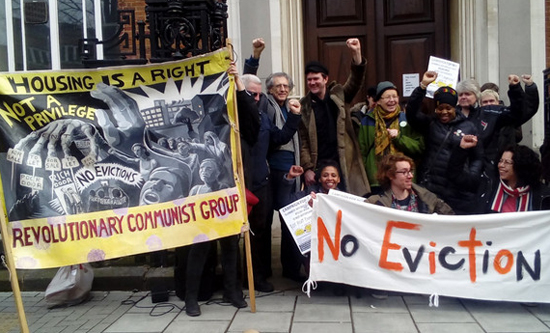
On 7 February shares in Britain’s biggest housebuilders soared as the government published its White Paper on housing; estate agent Savills saw a rise of 3.8%. The White Paper ensures that the drive for vast profits for multinational housing parasites will continue by intensifying the grab for public land, speeding up planning permission and throwing out planning regulations on quality and size. Key to the process will be the willingness of local councils to collaborate with private companies in delivering homes for market rent.
In launching the revealingly entitled Fixing our broken housing market, the Secretary of State for Communities, Sajid Javid, set out his plans for house-building to rise to an average 250,000 new homes a year. Last year the market delivered just 110,000 homes. The housing charity Shelter has shown that these were all unaffordable for 83% of working families. House prices are on average more than seven times local annual earnings (with a typical property in London’s affluent Kensington and Chelsea costing 38 times the average annual income of residents in the area and one in Copeland, Cumbria, at the other of the scale, costing 2.8 times typical local earnings); recent research by the European homelessness body found that rent swallows up more than 40% of income for 58% of private renters, as compared to a European average of 48% of those renting privately. How is this ‘market’ to be fixed?
The answer is, largely by forcing local councils to sell off even more public land, and co-opting them into building homes in the private sector. Local authorities will be expected to ‘standardise’ how they assess land and forced to list their ‘surplus public land’ on a revamped Land Registry. There will be stronger powers to enforce the development of such land, especially ‘brownfield’ sites (increasingly used as code for existing housing estates and public open spaces).
Alongside this, local authorities are encouraged to set up joint ventures with private companies to raise loans on the open market to build housing of whatever kind they choose. Not that they need much encouragement – 98 out of 252 councils have established or are planning a private housebuilding company. 24 intend to build or acquire mostly private rented homes, six focus on market sale and 12 on delivering a mix including affordable rent or shared ownership. (Inside Housing December 2016). None will be for social rent. London’s Labour councils are already amongst the most enthusiastic promoters of this new deal – Lambeth Homes in south London, and ‘Red Door Ventures’ in the east London borough of Newham are examples of such ‘special purpose vehicles’; most recently Haringey has entered into a joint venture with private developers Lendlease that will see £2bn worth of public assets sold off to fund the development of private housing. As the housing campaigner Joe Halewood points out, the private sector will only provide funding to social landlords if profits are guaranteed by charging full market rents and building at maximum density and at the smallest size. There will be no incentive for councils to build social or even so-called ‘affordable’ homes.
Alongside this, planning and space regulations are to be relaxed. The White Paper says local authorities, in granting planning permission, should ‘avoid a rigid application of open space standards if there is adequate provision in the wider area’ and review the Nationally Described Space Standard. Developers already largely ignore prescribed space standards anyway. A survey of the ten largest housebuilders in 2015 by RIBA found the majority of new-build three-bedroom houses outside London were four square metres smaller than guideline standards. Houses in England are already the most cramped in Europe with an average of just 71.9 square metres. The White Paper also encourages building at much higher density. Alongside this is the largely unregulated market in conversions, where family homes can be gutted and changed into ‘homes of multi-occupancy’ of six tiny flats or more; these shoddy conversions count as ‘new homes’ however poorly built or maintained they are. As Engels pointed out more than 150 years ago, under capitalism, ‘there must always be a tenant for even the most infamous pigsty’.
Finally, the White Paper sets out to minimise resistance to the continuing onslaught on working class homes. It intends to make the process of obtaining a compulsory purchase order in order to evict leaseholders on council estates easier. Often, as in the battle for the Aylesbury Estate in Southwark, south London, it is only by leaseholders challenging the CPOs at a tribunal that demolition has been halted. And it will become harder for members of the public to challenge planning applications. In the words of the White Paper, ‘These cause delay and waste taxpayers’ money.’ A fee of £2,000 to appeal against planning permission is mooted.
It is clear that, unless we fight back, the drive towards more insecure, inadequate and expensive housing for the mass of the working class will continue, as will the drive to demolish council housing stock. Homelessness is rising and the number of people living in temporary accommodation is up 50% since 2010. The European report on housing ranked the UK 20th out of 28 countries, with ‘a broken housing market out of reach for poor and middle-class people’. But the reality is the market has never delivered quality housing on a mass scale for the working class. The only time that has happened was when – for a brief and exceptional period after the second world war – the state intervened to build hundreds of thousands of publicly-owned homes for the working class. With social housing being written out of history it is clear that it is not the housing market, but the capitalist system itself that is broken beyond repair.
Cat Wiener




